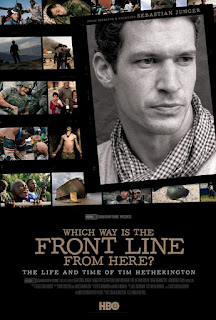
When I was at Sheffield DocFest last year, I saw the Tim Hetherington Award go to Matthew Heineman, director of Cartel Land (which I'll review later). Awards like this not only exist to honour the memory of those they're named after by awarding the best documentarians of the time but they also function to introduce us newbies in the industry to the greats who came before us.
Following the award I set out to find out more about who Tim Hetherington was and came across
Which Way is the Frontline From Here? There was something in this film that didn't just inspire me career-wise, but something that recognised the way I feel about about conflict. I am often asked how I can bear to watch documentary after documentary about pain, war and conflict and the only answer I've ever been able to give, is that in these films, I find more hope in humanity than I do, pain. To see humans struggle on, is something that always succeeds in getting me out of bed and committing to making a difference in the world somehow. Tim perhaps was different, it was his instinct, his nature, rather than just his passion. I have no experience to be able to know this yet. But this film shows certainly that he is someone to look to, when I think about my future.
 |
| foto8.com |
Tim was a photojournalist, humanitarian and film-maker and his unique way of highlighting the plight of those often forgotten is a value I hold very dear to my heart. I have in fact just enrolled in a photography course to expand my field of vision through the lens. Tim travelled to many places, finding himself in situations he had not trained for, just felt equipped for. In Liberia, he captured the the story of war through sport. In Sierra Leone he captured those left without access to substantial healthcare and the victims of the fighters of the Revolutionary Front, who were left blinded. He found a way of capturing the stories of war that are often forgotten, through photographs that speak far louder than those we are used to in mainstream media.
 |
| pinterest.com |
 |
| slate.com |
 |
| artnews.com |
Tim also managed to find friendship amidst the situations he found himself a part of. As his friend James put, 'he wasn't a humanitarian, or a journalist, or a photographer, he was just Tim'. He was unafraid of immersing himself in conflicts, he even stepped in to save a doctor's life when guns were pointed to his head - an act according to friends only Tim could have got away with. Then in Afghanistan, he again found himself at home within an angle of war, this time with the US army. Here he captured men in a place where they were allowed to love one another, and found innocent boys sleeping in their beds rather than the killing-machines they are often described as. Tim, despite the subject, always found the humanity in his photographs.
He continued to do so to his last moment as he chased towards the front-line in Libya, where he was killed by mortal fire alongside fellow photojournalists and civilians.
I find myself unable to say much more, how can I possibly review the making of a documentary capturing the life of a man whose job it was to do just that. The film captured moments of Tim's life we would not have seen without knowing him personally, with footage that showed him for the man he really was, a man who only ever had time for people above any form of standard journalistic practice. I'm glad I was there to see the Tim Hetherington Award presented in Sheffield, or perhaps I might never have known about the man he was and may never have learned from him the values I want to be a part of my own career in the future.
 |
| theguardian.com |
 When I was at Sheffield DocFest last year, I saw the Tim Hetherington Award go to Matthew Heineman, director of Cartel Land (which I'll review later). Awards like this not only exist to honour the memory of those they're named after by awarding the best documentarians of the time but they also function to introduce us newbies in the industry to the greats who came before us.
When I was at Sheffield DocFest last year, I saw the Tim Hetherington Award go to Matthew Heineman, director of Cartel Land (which I'll review later). Awards like this not only exist to honour the memory of those they're named after by awarding the best documentarians of the time but they also function to introduce us newbies in the industry to the greats who came before us.



